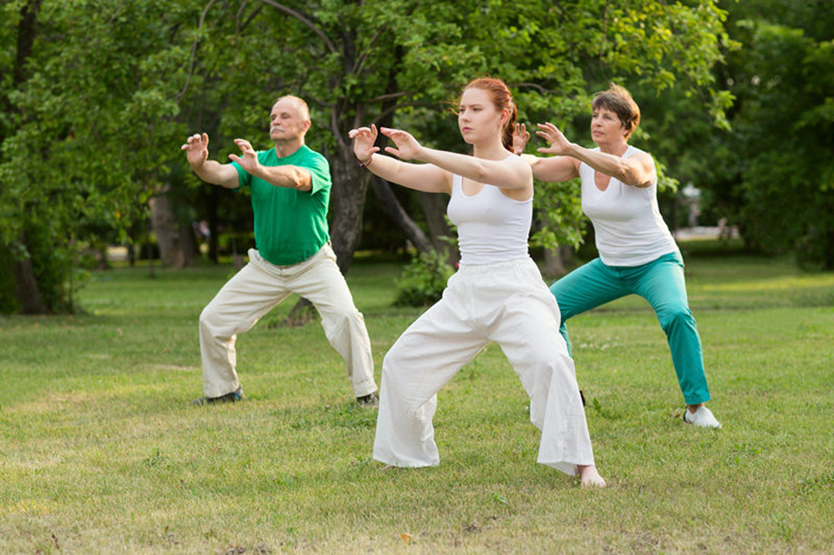Qigong Meditation Techniques: Benefits and How to Do It
Posted: August 19, 2021
Qigong meditation is an ancient Chinese healing practice that combines controlled breathing, gentle movement, and meditation to promote good mental, physical, and spiritual health.
Similar to tai chi, qigong meditation is believed to treat a variety of health conditions, including high blood pressure, heart disease, diabetes, chronic fatigue, insomnia, and leg and back pain, among others. Yet, research backing these claims is limited.
With qigong meditation growing in popularity, you may wonder whether it’s something you should try.
What is qigong meditation
Qigong (pronounced “chee-gong”) meditation is an ancient Chinese healing practice that combines meditation , controlled breathing, and gentle movement.
It’s roughly translated as “the master of one’s energy” and combines two important concepts of traditional Chinese medicine (TCM). Qi roughly translates to “vital life force,” while gong means mastery or cultivation.
This practice is meant to cultivate the energy and strength of nature into one’s body to promote better mental, physical, and spiritual health.
In TCM, poor health is the result of blocked energy that flows through the twelve meridians – or sections – of the body. Thus, qigong is believed to promote health by allowing your energy, or qi, to flow through the body.
SUMMARY
Qigong (pronounced “chee-gong”) is a traditional Chinese medicine healing practice that’s believed to support mental, physical, and spiritual health through gentle movement, meditation, and breathing techniques.
Types of qigong meditation While there are many ways to practice qigong, there are two main categories: active (dynamic) qigong and passive qigong. Active qigong uses controlled, slow movements, while passive qigong involves stillness and calm breathing.
Qigong can also be practiced internally (by yourself) or externally (via a qigong therapist). With external qigong, a therapist provides “emitted” qi to promote healing. Though, for most people, qigong is a self-healing technique that’s practiced without a therapist.
Regardless of the form of qigong, the goal is to allow energy to freely move throughout the body and reconnect with the earth for healing.
Active (dynamic) qigong Active qigong – also known as dong gong – involves intentional, active movement and breathwork that enhances yang energy. In TCM, yang represents active energy, strength, and vibrancy, while yin depicts passive energy, calmness, and gentleness .
It includes repeating gentle, coordinated movements to promote blood and lymphatic drainage
This type of qigong is considered exercise but shares mutual characteristics with passive qigong, such as good posture , controlled breathing, focus on relaxation, and visualization.
Passive qigong Passive qigong focuses on embracing yin energy through body stillness and the mental cultivation of qi energy .
During this form of qigong, the body is not moving externally, but the mind is actively working to cultivate and move qi energy throughout the body. This practice would be similar to traditional meditation.
SUMMARY
The two main categories of qigong include active and passive qigong. Active qigong uses controlled, slow movements to help energy – or qi – flow through the meridians of the body, while passive qigong involves stillness and calm breathing.
Benefits of qigong meditation Qigong offers many benefits. Some of them are backed by research, including improved balance and gait, as well as reduced stress levels. Other purported benefits include a lower risk of chronic disease and improved focus.
Increased balance Qigong focuses on controlled, slow movements of the body to improve your proprioception , or awareness of your body in space, which helps increase balance, muscular strength, and flexibility .
In a 2020 study in 95 adults ages 51–96, participants that practiced weekly qigong for 12 weeks had significant improvements in balance and gait
Interestingly, qigong can also improve balance in younger adults. One randomized pilot study in 30 people ages 18–25 showed a 16.3% increase in stability scores after weekly qigong for 8 weeks. No changes were observed in the control group.
Considering that all age groups can safely participate in qigong, it may be an effective and enjoyable strategy to improve balance and lower the risk of falls.
Lower stress and anxiety Qigong involves meditation, controlled breathing, and gentle movements, all of which have all been shown to help lower stress and symptoms of anxiety.
Calm, controlled breathing tells your body there’s no immediate threat and activates the parasympathetic nervous system — the “rest and digest” system. It also slows your body’s stress response system known as the hypothalamic–pituitary–adrenal (HPA) axis.
Also, incorporating qigong into one’s daily or weekly practice has been linked to greater quality of life due to less stress, greater self-efficacy , and better physical health. Still, higher quality studies are needed.
By incorporating qigong into your weekly or daily routine, it may help you better manage the daily stressors of life.
May lower risk of chronic disease Qigong is a gentle form of exercise and emphasizes calm, meditative breathing. Together, this may reduce stress on the body, increase blood flow, and improve your overall fitness — all of which can lower your risk of chronic disease.
In particular, qigong has been shown to lower the risk and improve symptoms of type 2 diabetes
Still, researchers urge that larger, more robust studies are needed before qigong can be recommended as a standard treatment.
That said, most people can safely practice it in addition to their current medical treatments prescribed by their healthcare provider.
May improve focus Many people struggle to focus on tasks due to the busyness of day-to-day life.
Qigong requires focus of the breath, mind, and body. Through regular practice, qigong may help improve your ability to focus and concentrate by helping you learn to regulate thoughts in a more productive manner.
For more information to get started in our qigon program, please visit our websie or call Sifu Agbay (508) 347-0001
https://mjamartialarts.com/programs/adult-programs/qigong
SUMMARY
The benefits of qigong include improved balance, greater mental focus, lower levels of stress and anxiety, and decreased chronic disease risk. Though many people report the benefits of qigong, larger studies are needed.
Resource information from https://www.healthline.com/

